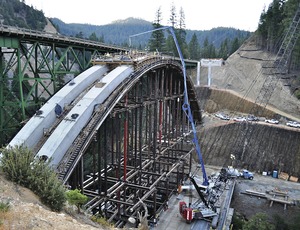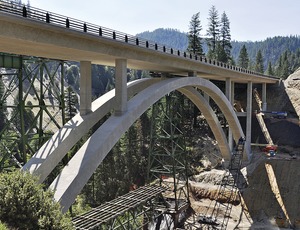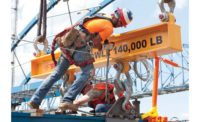Best Highway/Bridge Project, Northern California: Spanish Creek Bridge, Quincy


Located in a pine-studded canyon in the Plumas National Forest, this seven-span box-girder bridge is supported by an open spandrel arch. It replaces an obsolete bridge along State Route 70 near Quincy.
Despite the challenge of building next to the original 1932 steel truss bridge in an earthquake-prone area 160 ft above the Spanish Creek, the seismically engineered new bridge opened 108 days ahead of schedule. Measuring 627 ft long and 43 ft wide, with a 354-ft arch, it is one of just four arched bridges constructed in the last half century in California.
"The design and construction team managed engineering and environmental challenges by using existing technology in an unconventional way to replace a structurally deficient canyon bridge with a new structure that is economical, aesthetic and safe," says Dan Himick, president of C.C. Myers Inc., the project's contractor.
The project team used an innovative mass-concrete cooling system to pump cold water from the creek below and circulate it through the arch concrete pour, rather than using a high-cost chiller. The process saved about $200,000 and almost 1,000 gallons of diesel fuel per day, with no damage to the environment, the contractor says.
For access, three trestles were erected to traverse the canyon and a 75-ft-high stabilizing soil nail wall was built at creek level. The bedrock challenged the drilling crew.
Slides and flooding are common in the area, and the remote site made delivering materials and heavy equipment complex. Because most bridges in the area are not rated to carry excavators or cranes, a five-hour haul-around was required to get from one side of the canyon to the other.
To realign the road for the bridge, blasting was required to cut 50 ft farther into the canyon wall. But a railroad tunnel was located just 142 ft from the intended cut, with the bottom of the blast just 6 ft higher than the tunnel's peak. Using seismic sensors, it was determined that the blasting caused less seismic activity than passing trains did.
The project team safely performed 70,765 man-hours without a recordable injury.
Key Players
Contractor C.C. Myers, Rancho Cordova
Owner Caltrans, Sacramento
Lead Design/Engineer Caltrans, Chico
Subcontractors Drill Tech, Antioch; Knife River Construction, Chico; Pacific Coast Steel, Fairfield; W.C. Maloney, Stockton; Neil’s Controlled Blasting, Newcastle


Post a comment to this article
Report Abusive Comment